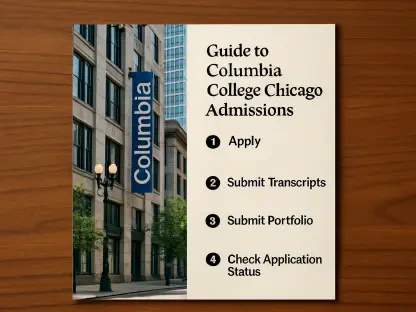In the ever-changing landscape of education, where the arts often struggle to gain the recognition they deserve, one educator at the University of Nebraska at Kearney (UNK) stands out as a true source of inspiration and transformation. Christopher Strickland, an assistant professor, has devoted his career to demonstrating that art is not merely a subject, but a powerful force capable of shaping lives and communities. Recently honored by the Nebraska Art Teachers Association (NATA) with prestigious awards, Strickland’s journey from a young artist in New England to a key figure at UNK reflects his deep commitment to teaching with passion. His roles as director of the online master’s program in art education and associate dean of engagement and retention in UNK Graduate Studies and Academic Innovation highlight his wide-ranging influence. Guided by the philosophy that work is love made visible, as inspired by Kahlil Gibran, Strickland continues to redefine art education. This exploration delves into his inspiring path, innovative contributions, and the broader significance of his work in today’s educational sphere.
Roots of a Creative Calling
Christopher Strickland’s passion for art and education took root during his formative years in Maine and near Boston, where a supportive art teacher ignited a lifelong love for creativity that would shape his future. This early encouragement led him to envision a career where art could serve as a medium for personal growth and connection. After earning degrees in art education and educational leadership, Strickland spent 16 years teaching in New Hampshire schools, refining his skills and deepening his understanding of how artistic expression influences learning. His transition to UNK in 2022 marked a new chapter, where he embraced the community as a true Loper, finding a profound sense of purpose. This journey underscores a fundamental belief that art is more than a discipline—it’s a pathway to understanding oneself and others, a perspective that continues to inform every aspect of his professional endeavors.
At the core of Strickland’s approach lies the conviction that teaching is far more than a profession; it’s a calling that demands heart and dedication. He views art as a powerful tool for healing and transformation, capable of bridging gaps and fostering empathy among students. This philosophy resonates deeply within the halls of UNK, where his commitment to nurturing creativity has created a lasting impact on those around him. Unlike traditional views that may sideline the arts, Strickland champions their role as essential to holistic education, encouraging students to explore their identities through creative means. His personal connection to this mission is evident in the way he engages with each individual, ensuring that the classroom becomes a space for meaningful discovery. This foundational belief not only drives his teaching but also shapes the innovative programs and initiatives he leads, setting a standard for what education can achieve when infused with genuine care and vision.
Innovating Access Through Digital Learning
One of Strickland’s most significant contributions at UNK is his leadership of the online master’s program in art education, a pioneering effort designed to support working professionals across diverse settings. With specializations in classroom and museum education, the program’s asynchronous format offers unparalleled flexibility, catering to educators who juggle demanding schedules, particularly those in rural areas. This structure ensures that geographic or time constraints do not hinder professional growth, making advanced education accessible to a wider audience. By prioritizing inclusivity, the initiative addresses a critical gap in the field, allowing art teachers to pursue further learning without sacrificing their current roles. Strickland’s vision for this program reflects a broader movement in higher education toward adaptability, ensuring that the benefits of specialized training reach those who need them most, regardless of location.
Beyond accessibility, the online program serves as a vital lifeline for art educators who often feel isolated as the sole representatives of their discipline in their schools or districts. Strickland has cultivated a supportive network within this virtual space, fostering collaboration and a sense of belonging among participants. Students emerge from the program not just with enhanced skills but with renewed confidence, inspired by an environment that treats them as valued peers rather than mere learners. This emphasis on community combats the professional solitude many face, replacing it with a shared commitment to growth and creativity. Testimonials from graduates highlight how this connection transforms their outlook, empowering them to bring fresh perspectives back to their classrooms. Strickland’s dedication to building these bonds mirrors a growing recognition in education that collective support is as crucial as individual achievement, reinforcing the idea that no educator should stand alone.
A Legacy of Recognition and Influence
Strickland’s unwavering dedication to art education has earned him notable accolades from the Nebraska Art Teachers Association, including the titles of Outstanding Art Educator of the Year and Higher Education Art Educator of the Year for the current year. These honors reflect not just personal achievement but a profound influence on the field, as acknowledged by peers and students alike. UNK senior lecturer Christy Kosmicki has described him as a benchmark for excellence, noting his empathetic teaching style and innovative methods that set a high standard for others. Such praise underscores the depth of his impact, extending beyond mere instruction to embody mentorship and inspiration. These awards serve as a testament to a career built on the principle that education, especially in the arts, can be a catalyst for profound personal and communal change, resonating with all who encounter his work.
Further amplifying his influence, Strickland champions arts-based research, an emerging methodology that integrates creative inquiry into academic exploration, offering new ways to understand educational challenges. Alumni like Kameran Dostal have lauded his mentorship, crediting his kindness and forward-thinking approach for shaping their professional paths. His contributions also span curriculum development and community outreach, ensuring that art education’s value is recognized on a broader scale. By advocating for the arts as a vital component of learning, Strickland positions himself as a leader who not only teaches but also redefines the discipline’s role in society. This multifaceted impact highlights a shift in educational paradigms, where educators are valued for their ability to innovate and inspire, pushing boundaries to ensure the arts remain integral to fostering critical thinking and emotional resilience in students of all backgrounds.
Shaping the Future of Art Education
Reflecting on Christopher Strickland’s career at UNK, it’s evident that his approach transcended traditional teaching, weaving a tapestry of innovation, community, and heartfelt dedication that left an indelible mark on the field. His belief in art as a transformative force was not just a philosophy but a lived practice, evident in every interaction and initiative he undertook. From nurturing individual students to building supportive networks through digital platforms, his efforts consistently prioritized connection and growth over mere accolades. The recognition from NATA stood as a fitting acknowledgment of a legacy that went beyond personal success, touching countless lives through a commitment to the arts as essential to human development.
Looking ahead, Strickland’s work offers a blueprint for the future of art education, emphasizing the need for accessibility, collaboration, and creative exploration in academic settings. Educators and institutions can draw inspiration from his model, integrating flexible learning opportunities and fostering environments where art is celebrated as a cornerstone of learning. His advocacy for arts-based research also paves the way for new methodologies that blend creativity with scholarly rigor, promising to expand how educational challenges are addressed. As the field continues to evolve, the focus should remain on empowering educators with the tools and communities they need to thrive, ensuring that the transformative power of art reaches every corner of society through passionate, innovative teaching.









